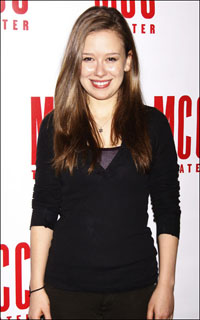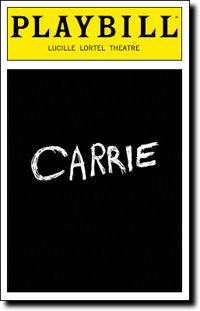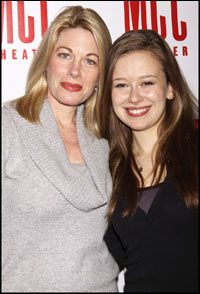
*
Director Stafford Arima, who gave Off-Broadway the camp boyband musical comedy Altar Boyz and was Olivier Award-nominated for his direction of the London premiere of Ragtime, is working with composer Michael Gore, lyricist Dean Pitchford and original screenwriter Laurence D. Cohen to pump fresh blood into the flop musical Carrie for a production by Off-Broadway's MCC Theater at the Lucille Lortel Theatre. They've stripped the musical of its broad spectacle and camp baggage (remembered by many from the original 1988 Broadway production), getting to the heart of the Stephen King story — the tale of a girl who is different.
Carrie now focuses on the outsider and the imposter that lurks within all of us. In a ripped-from-the-headlines vein, the central character is a bullied teen, with a more-than-troubled home life, who is desperate for a place to fit in. As we all know, bullying has consequences. And in the case of Carrie, they are cataclysmic.
Playbill.com spoke with Arima during early rehearsals of Carrie, which is currently in previews at the Lucille Lortel Theatre. It will officially open Off-Broadway March 1, with Molly Ranson (August: Osage County) in the title role and Tony nominee Marin Mazzie (Ragtime, Passion, Man of La Mancha) as her mother, Margaret.
What are your first Carrie memories? How did you first encounter the material — was it the novel, the film or the musical?
Stafford Arima: My first memory was the film. I think De Palma's film, for most of us, was etched in our heads and there are certain iconic images from that film that, I think, still keep us up at night, in nightmarish form. Then, I saw the musical in 1988. I was 19 years old — came down from Toronto, which is where I'm from, and sat in the Virginia Theatre with my mother on a Saturday matinee and experienced another very visceral experience. It was like a rock concert in many ways. I couldn't believe the kind of visceral response that the audience and, inevitably, the performers gave to one another. It was like a feedback loop. They were giving it to us, we were giving it back to them. It was an event. Those are really my only two experiences.
| |
 |
|
| Molly Ranson | ||
| photo by Joseph Marzullo/WENN |
SA: When I was excited about revisiting Carrie [the musical], I went back to read the source material, and I had never read King before, so it was my first time experiencing kind of where it was birthed from. And, what's really fascinating about the novel versus the film versus the musical is that, inevitably, they are all very different. It was really important for us — me and the authors — when we approached coming back to Carrie and reinventing it for 2012 that we took a very hard look at making sure that we were making this presentation, making this story, making this narrative its unique, own self — we weren't putting the novel on the stage or putting the movie on the stage — that we were bringing to life Carrie in a theatrical way. So, that's been a very exciting process over the last few years of development.
What are some of the things you remember from seeing Carrie the first time onstage? What was your gut reaction?
SA: When I experienced Carrie in 1988, the first thing that I was floored by was the design. The design was very unique. It was this kind of white box. I just have vague images, but it was very abstracted. It was not literal in any way, and that was a new form of storytelling for me — a new form of how to use, basically, a black box space and invent within that space. So, that was what really locked inside of me, and, maybe, just as kind of a young director-in-training, the visual was very exciting for me. And then, of course, the event of being at Carrie was just an event in itself. Coming from Toronto, that was a time when there wasn't an internet, there weren't chat rooms or boards, so all I knew was that I was coming to see Carrie, and I had seen the movie, and I was experiencing something brand new.
| |
 |
|
| The Playbill cover for Carrie |
SA: You know, I think, inevitably, the exciting idea or the story behind Carrie is the universal theme of being different. We all know what it's like to not fit in — even if we were actually in the in-crowd, sometimes you don't even fit in within the in-crowd. So, being different, whether you're male or female or black or white or gay or straight or heavy or thin, we all know what it feels like to be different. And, so, that story and that universal kind of theme is what, for me, drives this piece, and, inevitably, what makes the story of Carrie that much more kind of connected for people to be with and to experience.
Were the writers hesitant come back and work on the piece again? You've spent a good deal of time refining the material in workshops the past few years.
SA: The authors have been ridiculously excited and so helpful. Since the first meeting that we had, which was in October of 2008 until 2012 — March 1, when we open — they have been relentless in continuing to ask the questions, continuing to dig deeper into the material. Obviously, we have an extraordinary five-week preview period where we will continue to unearth the truth and unearth more possibilities within this piece. It's a very unique story. And, the storytelling properties — through song and through movement and through design and through the actors — are going to be very kind of fine-tuned during the preview process. It's been a really exciting rollercoaster ride with the authors because they have been so open, they've been so accessible and so interested in reinventing Carrie for 2012.
How many new songs in there?
SA: You know, I don't actually know how many new songs because there have been ones that have been cut. We've been doing the rewriting process really for the last four years. A lot of the material has been re-looked at. A lot of the songs have been cut…some of the fans who know all those bootlegs will be very sad they're not there anymore. New songs have been written. Songs have been re-lyricized now. It's really brand new, and, I think in many ways, the hope is that any of the wonderful fans who are coming to experience what they either saw on a bootleg or perhaps what they saw in 1988 will be pleasantly surprised that it will be a new Carrie — something new for this generation versus a wonderful kind of historical relic of the late '80s.
| |
 |
|
| Marin Mazzie and Molly Ranson | ||
| photo by Joseph Marzullo/WENN |
SA: Inevitably, the dark magic or the menacing kind of element that is inherent in the material is going to be brought to life in a very theatrical way here at the Lucille Lortel. We are dealing with a much more compact, intimate space. People consider this like a "horror musical" — in essence, it's not a horror musical. What people experience are horrific situations, perhaps horrific psychological kind of ramifications of relationships between people, but at its core, we're dealing with a human story about a girl who's different — and her relationship with her mother, her relationship with her peers and, inevitably, her relationship with herself. So, I'm hoping that the human story will be the thrust of the piece and the theatrical elements that incorporate menace or dread, maybe come as sprinkles on top of that cake. So, the first couple of rows won't be blood-splatter zones?
SA: [Laughs.] The first couple rows will not have… No, there won't raincoats or anything that people have to wear here at the Lortel.
(Adam Hetrick is a staff writer for Playbill.com who also contributes to Playbill Video and Playbill magazine.)










